One of the biggest concerns facing dog owners is finding the balance between giving them treats and ensuring they have a healthy diet.
Many people are simply unaware of the dangers of feeding their precious pets the wrong thing, and the last thing anyone wants is to make their furry friend ill – or worse.
It is easy to assume that they can happily tuck into the same foods we eat, especially when they sit there begging us for scraps.
But we do need to be very careful about what we include in their diet. So, can dogs eat sauerkraut?
What is sauerkraut?
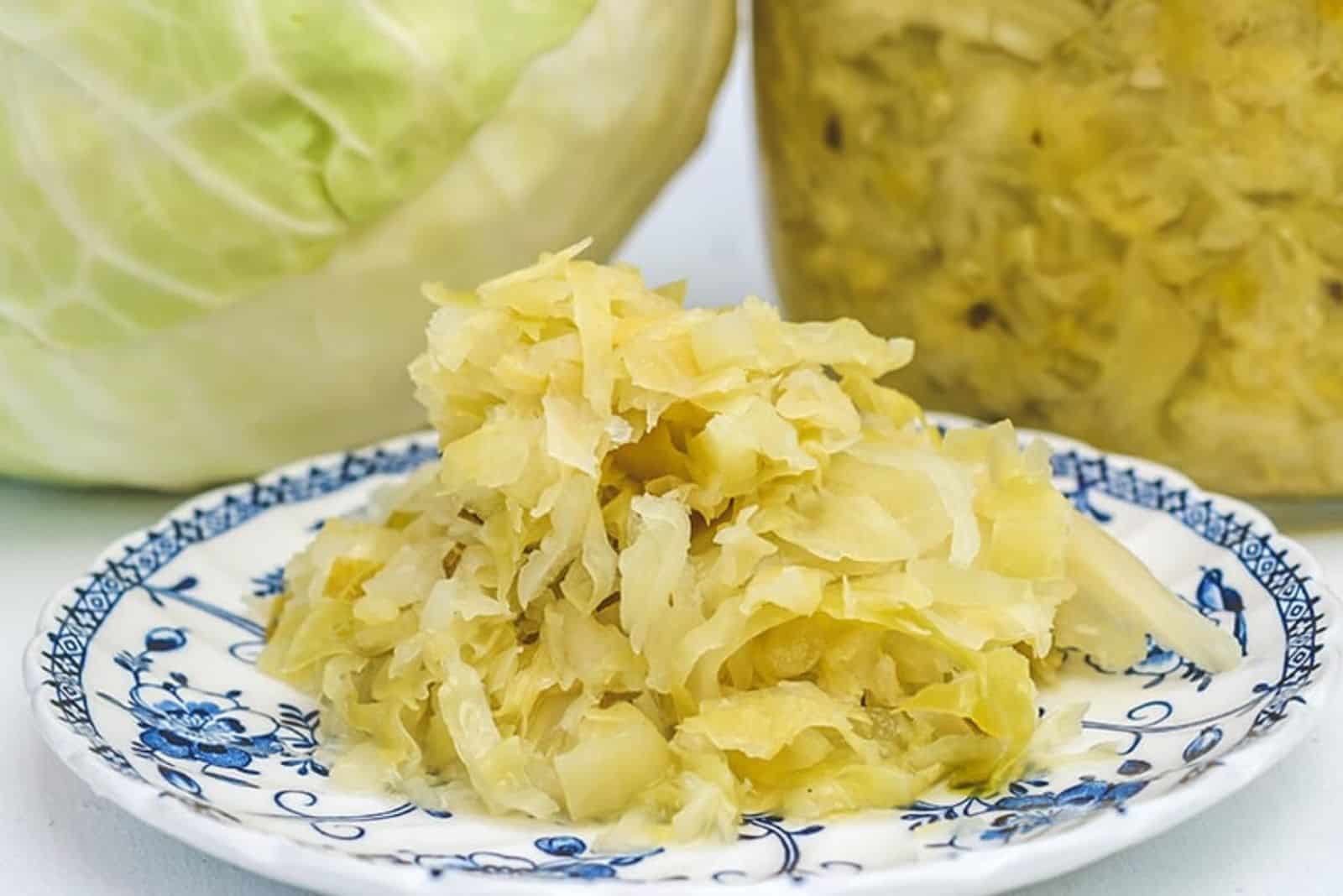
Who reads the ingredients list on the side of the packet or jar? Maybe you do, but few people bother to do so, especially with things like sauerkraut. Everyone knows it’s just cabbage, right?
But look closer at any product, and you may find particular ingredients lurking there that may be bad news, if not for you, then possibly for your pet.
While the ingredients may be fine, there are sometimes hidden dangers in the manufacturing process, so it pays to look a bit closer at this just to be on the safe side.
What about sauerkraut? Is it safe for dogs to eat? Let’s examine it in detail to help put your mind at rest.
Sauerkraut is made using finely shredded cabbage that is ‘pickled’ through the process of fermentation.
It has always been popular in countries where pickling was traditionally used to provide sustenance throughout the colder seasons when fresh food was scarce.
The pickling process not only helps to preserve the food but can also provide some unexpected health benefits.
The traditional way of making sauerkraut simply uses salt, which is added to the shredded cabbage in small amounts at a time.
The salt expels any water within the cabbage leaves, allowing air-borne bacteria (lactobacilli) on the cabbage leaves to react with the natural sugars.
This then ferments, generally in a three-stage process that eliminates the possibility of harmful bacteria such as clostridium botulinum (the cause of botulism).
In more recent times, pickling vinegar has been used, but this affects the fermentation process and significantly reduces the health benefits as it inhibits the growth of healthy bacteria.
Similarly, canned sauerkraut is often pasteurized, which effectively does the same thing, making the product less healthy.
Freshly made sauerkraut, when fully cured, will last between four and six months in a sealed container, kept below 15° C (60° F).
Be aware, though, that if new bacteria grow (due to repeated opening of the container), the batch will spoil. Any discoloration or rotting odor is a sign that you should throw it out.
Sauerkraut has hundreds of culinary uses, either as a side dish, on its own, or in place of salsa, on hotdogs, or as a dip – the list goes on.
But what’s so great about it, and how do you go about making sure it’s safe for your dog to eat?
What are the benefits?
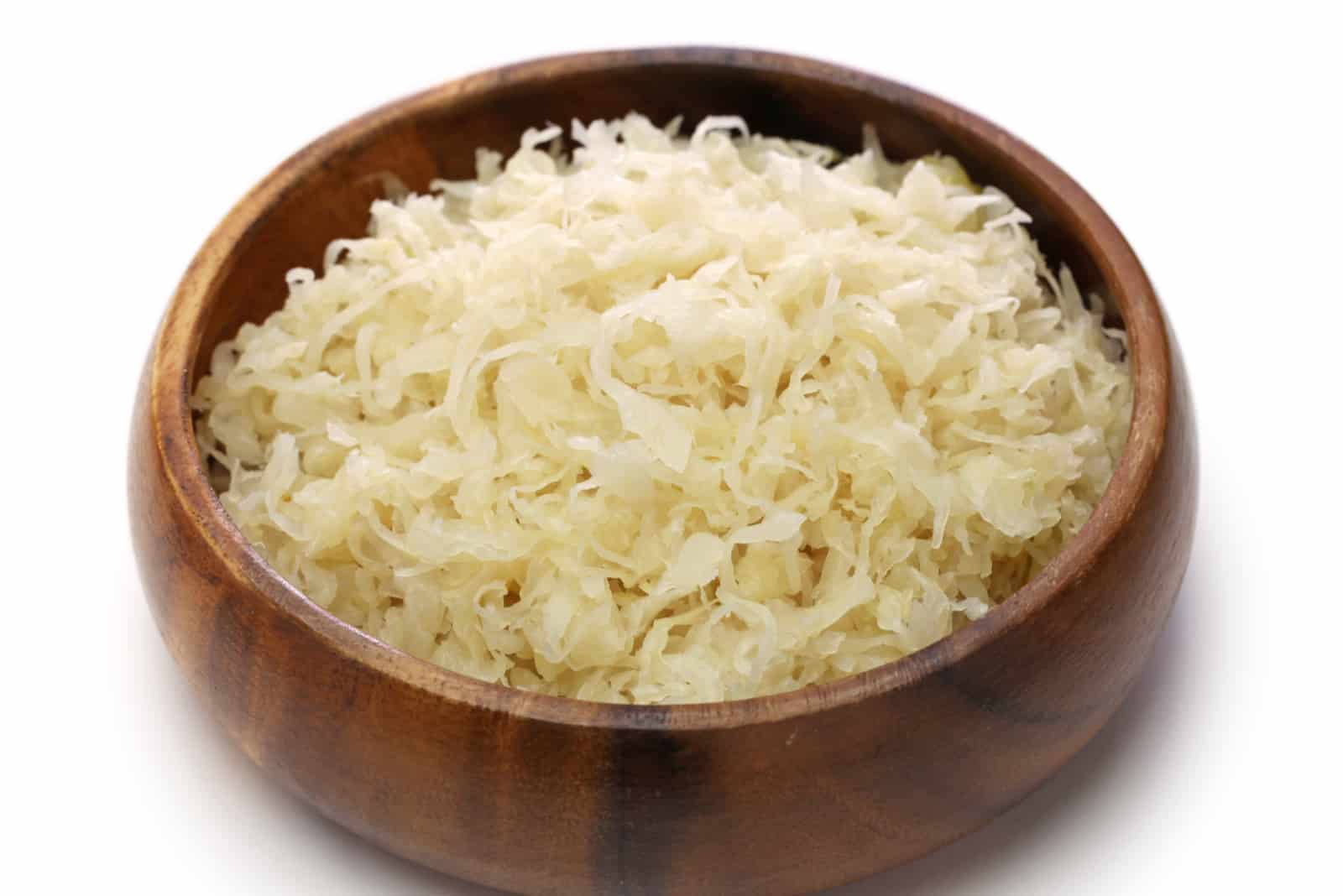
Humans have consumed sauerkraut and similar fermented foods for thousands of years. The reasons for this are many and may come as a surprise.
For example, here is a list of the nutrients you might find in a typical batch of sauerkraut:
• Vitamin A
• Vitamin B-6
• Vitamin C
• Vitamin K
• Calcium
• Iron
• Magnesium
• Potassium
• Copper
• Manganese
It also contains carbohydrates and protein. No wonder it’s referred to as a ‘superfood’!
Aside from these essential nutrients, sauerkraut is prized for its probiotic properties. The healthy bacteria in sauerkraut promotes gut health.
Being rich in enzymes, it allows for easier digestion and protects against many illnesses. It is high in fiber but low in calories.
It is also high in antioxidants, with research suggesting that it inhibits certain types of cancer.
You can see, then, why it has proved popular amongst humans for so long! But what about dogs? Does it have the same effects and benefits? Or is there a risk involved?
Sauerkraut for dogs
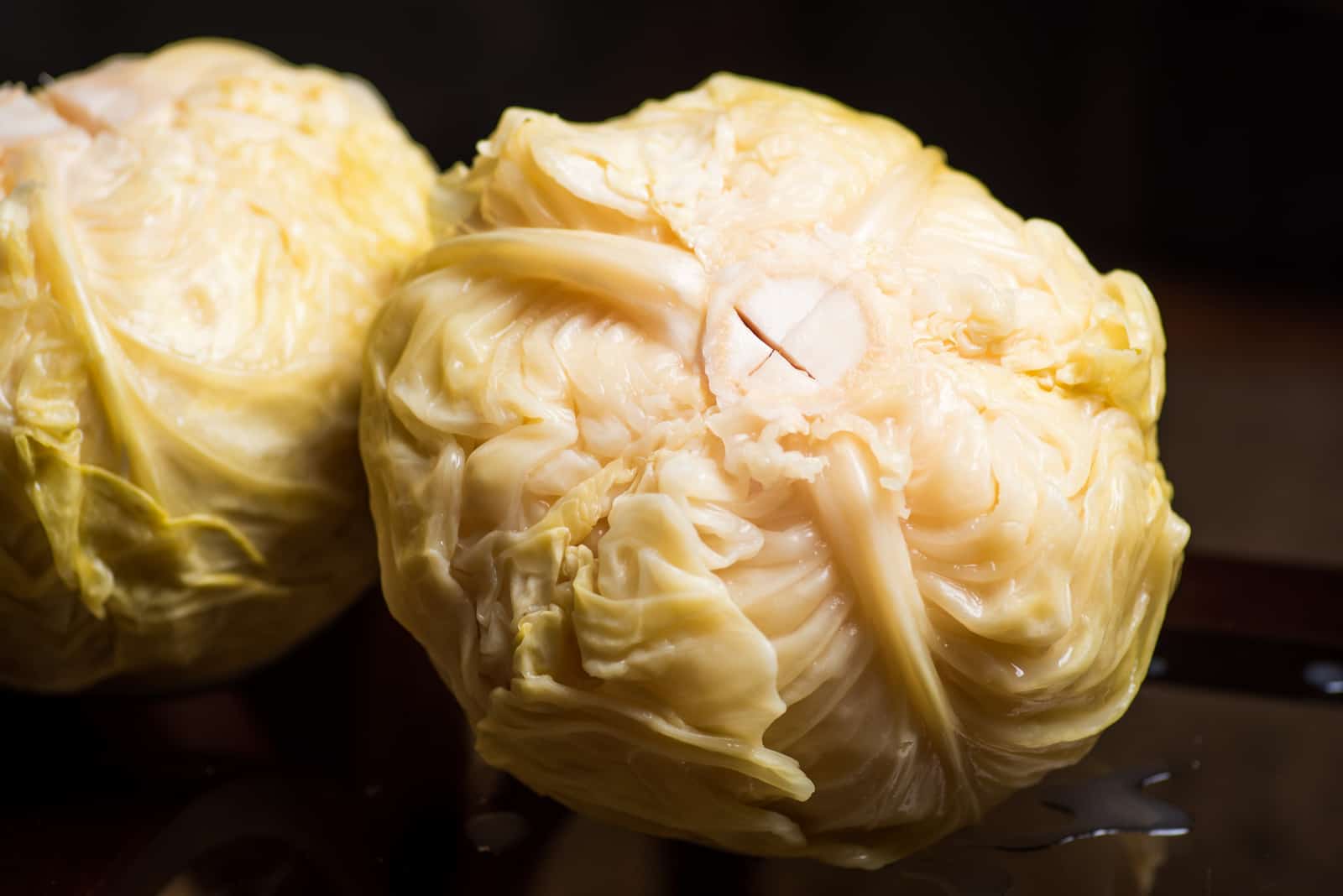
Generally speaking, sauerkraut is perfectly safe for dogs to eat and can offer the same health benefits as it does for humans.
However, there are some pitfalls to look out for, which we’ll come to later.
Firstly, let’s examine just how this superfood can help you look after your beloved pet.
Healthy eyes
Vitamin A, along with the powerful antioxidants lutein and zeaxanthin, can help to drastically reduce the risk of cataracts forming, especially in older dogs.
Antioxidants are excellent in fighting free radicals that cause mutations in healthy cells, which can lead to a number of health problems.
Reducing the risk of cancer
Sadly, cancer is an all-too-common problem (especially amongst certain breeds) that has broken the hearts of countless pet owners.
A diet rich in antioxidants, as mentioned previously, can help to reduce the risk. The presence of isothiocyanate (anti-carcinogenic compounds) in sauerkraut adds to the fight against the development of tumors.
Healthy bones
Vitamin K, along with the multiple vitamins in sauerkraut, promotes strong, healthy bone growth, essential for puppies right through to mature dogs.
Anti-inflammatory qualities
Joint stiffness and pain can be a real problem in older dogs suffering from arthritis and similar conditions. The phytonutrients provided by sauerkraut (and other veggies) have an anti-inflammatory effect, reducing the pain and easing the stiffness of the joints.
The probiotic qualities also have an anti-inflammatory effect, helping to combat allergies, reduce the risk of infection, and aid with overall health.
Healthy gut

Photo from: @aussie.doggo
Probiotics again! They’re so helpful in maintaining good gut health, reducing the risk of gastric ulcers and diarrhea.
Flatulence can be a nasty problem, as can constipation and bloating – probiotics and fiber help minimize these, bringing welcome relief to your precious pet.
Nutrients are absorbed quickly and easily, and food sensitivities can be overcome.
Glutamine, present in all types of cabbage, is renowned for its ability to heal peptic ulcers and is used to aid the proper functioning of the digestive system.
Healthy heart
Older dogs, in particular, can be prone to obesity. The probiotics in sauerkraut help to lower cholesterol levels and removes fat from the body.
This can be a great way of preventing strokes and cardiovascular issues.
Healthy immune system
A well-balanced, functioning immune system is vital for your dog’s continued health. Sauerkraut is packed with vitamin C, which boosts the immune system by increasing the white blood cell count and helps with cell regeneration.
Vitamin C also aids the formation of collagen required for healthy muscles, organs, and bones.
Maintaining the immune system will help avoid a whole host of health issues in the future, resulting in a happier dog and fewer veterinary bills!
Healthy brain and organs
Iron deficiency is one of the leading causes of lethargy and metabolism problems in dogs, especially in animals suffering from anemia.
The iron (and other minerals) in sauerkraut can provide a much-needed boost, improving blood circulation, which ensures that the brain and vital organs receive adequate oxygen.
Brain function is also boosted by the increased production of omega-3 fatty acids.
Healthy coat
Vitamin A is essential for a healthy coat. A lack of vitamin A is apparent in dogs with dry, flaky skin and a dull coat that doesn’t have a healthy sheen.
Antioxidants and vitamin C also play a part here, helping to eliminate the free radicals which contribute to the aging of the skin.
In addition to all of these wonderful properties, the risk of serious infections (including E. Coli and salmonella) is drastically reduced. Studies even claim that it can help to soothe anxiety in dogs.
Potential problems to look out for
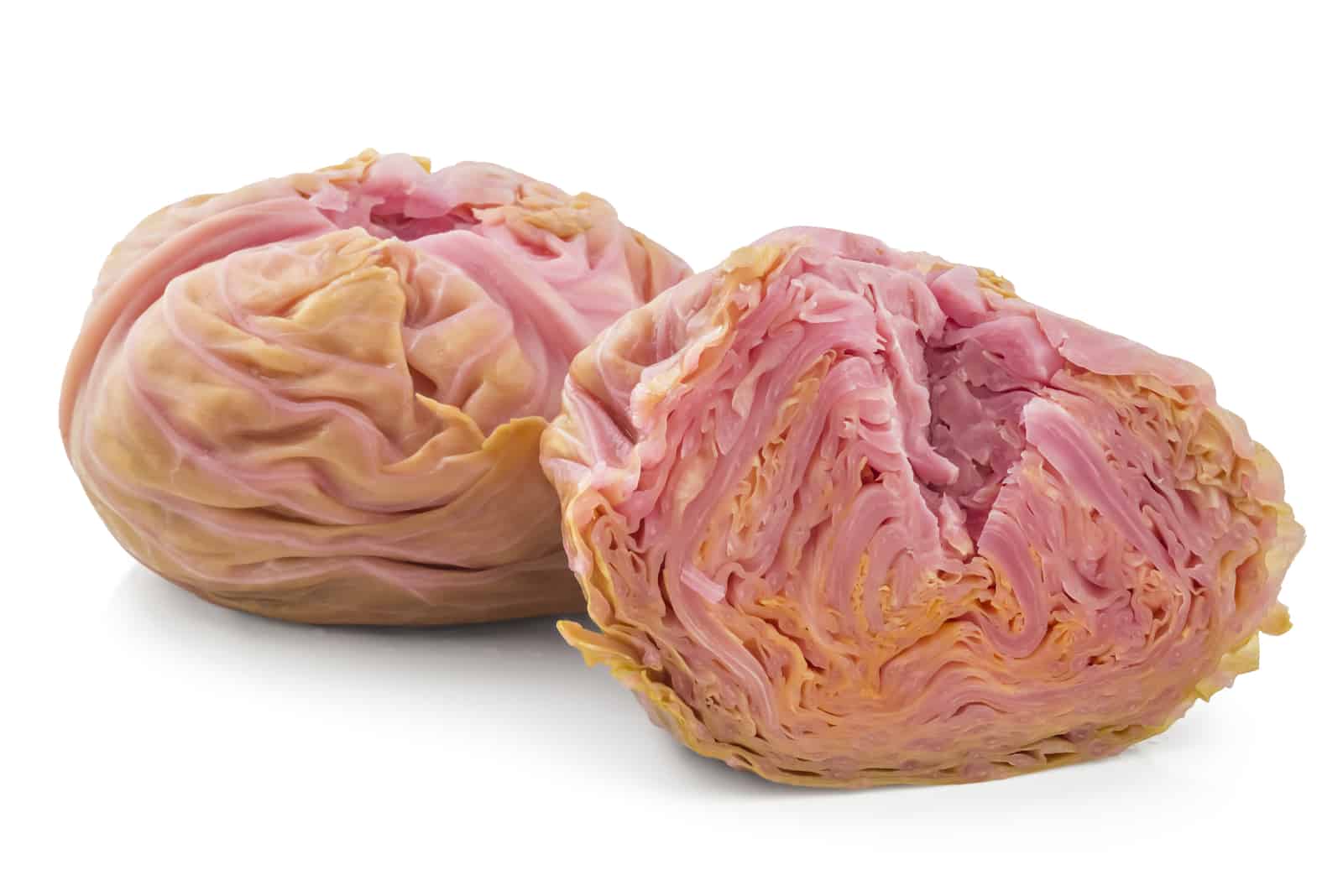
As we’ve seen, sauerkraut has some seriously good qualities that can be beneficial to your dog as well as for your own health.
But, as pointed out right at the start, you need to be aware of hidden ingredients, as well as other possible risks.
Firstly, there’s salt. It’s a condiment that’s often overused, with the impact on our health being all-to obvious.
An excess of sodium can cause serious problems, particularly in dogs with a history of kidney or heart problems.
In these cases, consult your veterinarian before changing your dog’s diet in any way.
In fact, you would be well advised to have a chat with them about the sodium intake that is suitable for your dog, regardless of any underlying health issues, as they will be able to recommend a safe amount according to the weight and size of your dog.
Other potential health risks involve ‘extras’ included for flavor, such as caraway seeds and juniper berries.
Caraway seeds (also known as Persian cumin and meridian fennel) are listed as being toxic to dogs and should be avoided as far as possible.
This isn’t to say that it would necessarily result in death, but it would probably cause vomiting and/or diarrhea, likewise with juniper berries, which could have the same effects.
How do I feed sauerkraut to my dog?
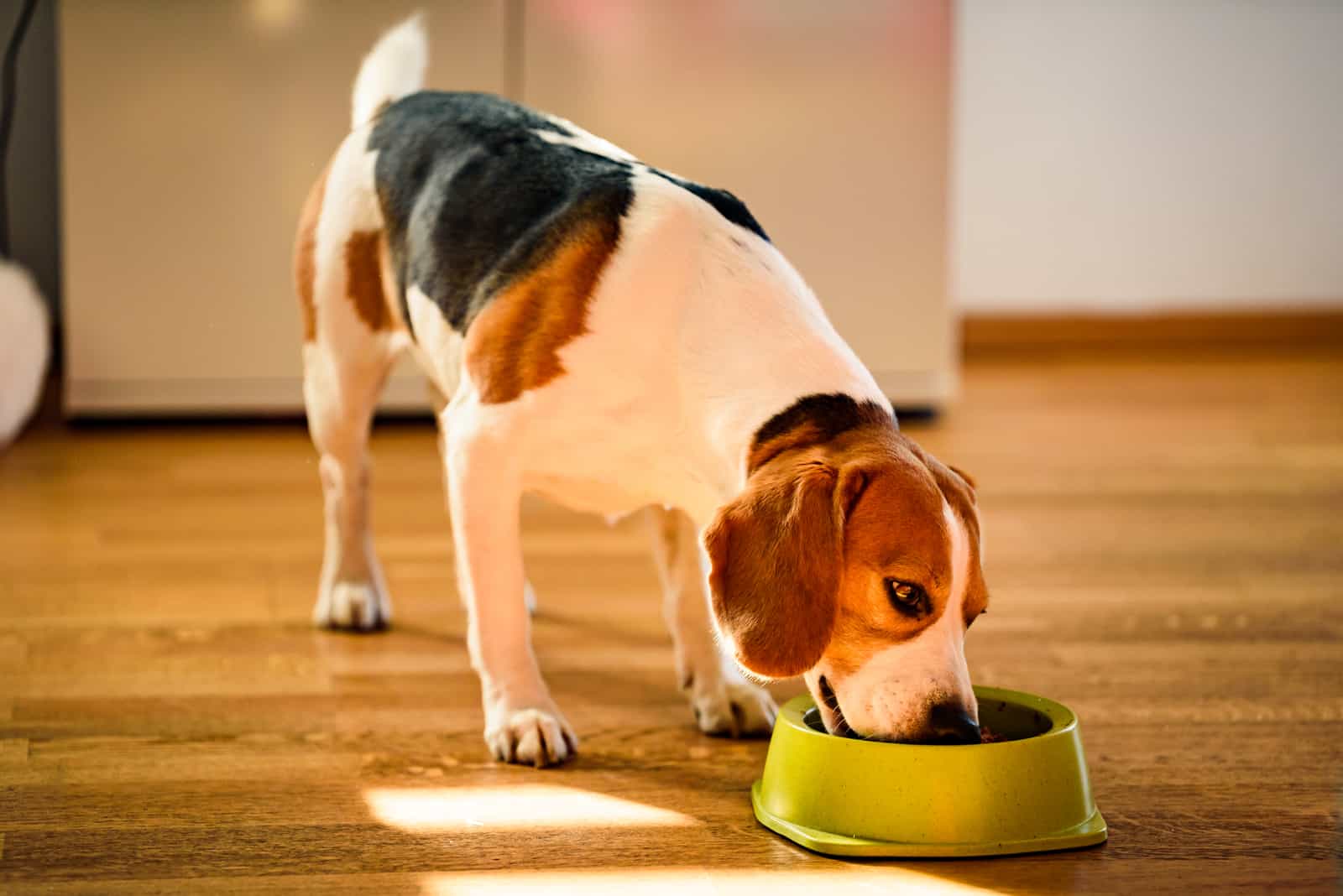
After all this, there is always the chance that your dog will turn its nose up when presented with a bowl full of sauerkraut. This isn’t the best way to approach the task; it needs to be undertaken slowly.
The thing is, their noses are vastly more sensitive than ours. That sharp, vinegary smell will be magnified between 10,000 and 100,000 times! Don’t be too surprised if they run a mile.
Heating the sauerkraut will not only increase the odor but can also reduce its health benefits, so try to use it ‘raw’ where possible.
However, heating it gently or cooking it with fruit, such as apples, may reduce the pungency without affecting its nutritional value too much.
Soaking raw sauerkraut in water can also take away the strong smell, allowing you to sneak it into your dog’s food almost undetected.
The best way to introduce it to their food is in tiny amounts, combined with their usual dog food. Start with a small spoonful, chopped finely and mixed in with ‘wet’ food, ideally along with something to mask the smell, such as an oily fish.
If possible, gradually increase the amount over some time. Don’t be impatient – you are more likely to put them off.
And if they really don’t take to it, then never be tempted to force it on them, as they won’t thank you for it!
Watch out for any changes in their behavior, especially in the bowel area. Some dogs may react badly. If they are affected adversely, leave it out of their diet completely.
However, if they don’t show any signs of discomfort and are happy to eat it, then they should enjoy the benefits almost immediately.
Conclusion
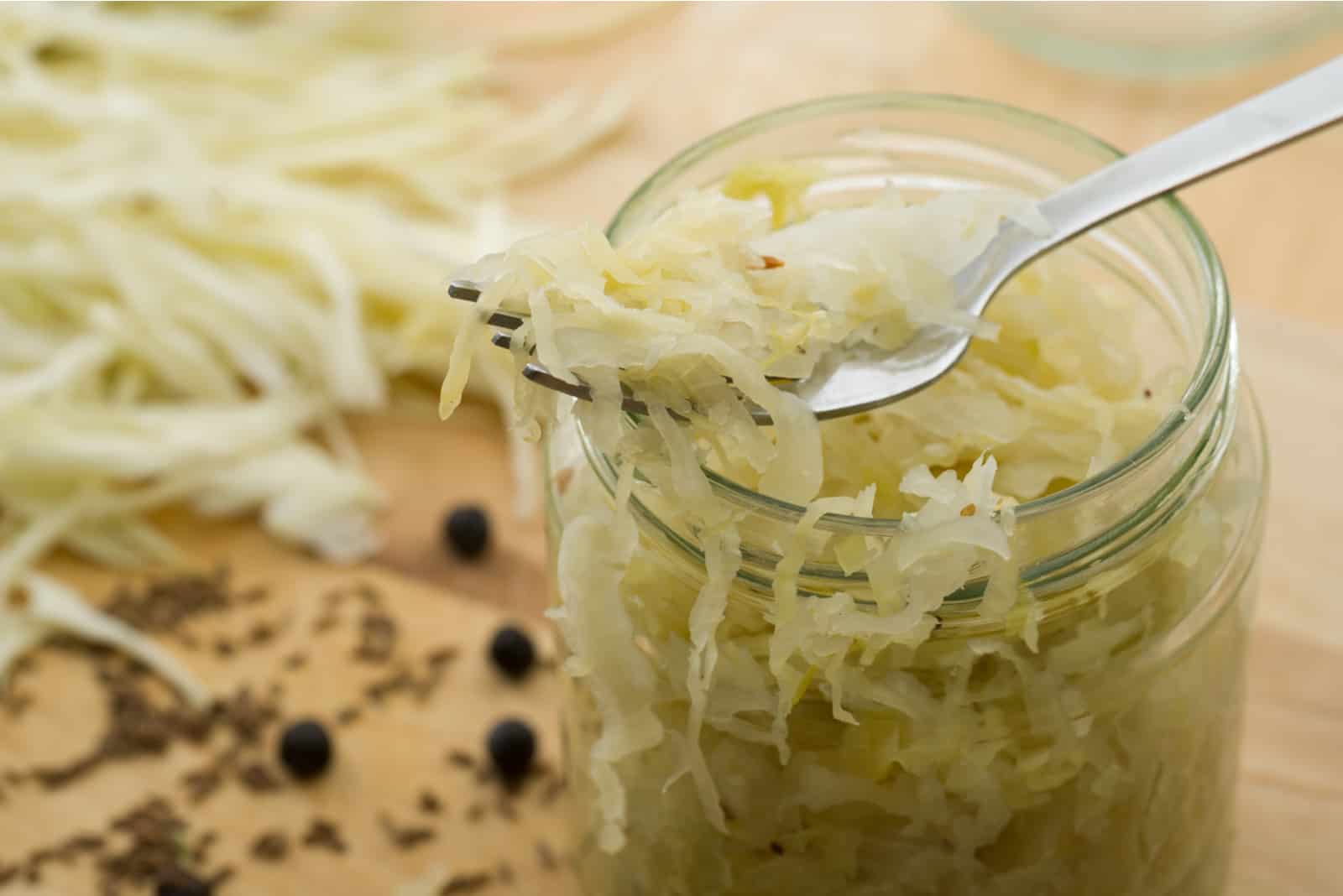
At the start, we asked the question, can dogs eat sauerkraut? As we discovered, the answer is yes!
In modest amounts, along with regular food, sauerkraut can offer enormous health benefits to your dog – provided you are careful and watch for any signs of trouble.
Avoid giving them too much salt, steer clear of any other additions, such as caraway seeds and juniper berries, and you’re on to a winner.
Never be tempted to feed them too much, or the effects could be unpleasant for you as well as your beloved pet.
It is always best to use fresh, unpasteurized, homemade sauerkraut, as canned varieties won’t hold anywhere near the same benefits and may even have additives, preservatives, and extra salt.
There is a chance that your dog may be a bit ‘gassy’ after eating it. If so, ease up a bit and find the right balance – it’s understandable to want them to be as healthy as possible, but don’t overdo it with the amount.
Again, raw is always best as cooking it will probably destroy the enzymes that make it a superfood. Sauerkraut is safe for dogs, provided you follow the advice.
It can help give puppies a helping hand with their immune systems as well as ensuring your older pets enjoy their ‘twilight years’ in good health.
Read Next: Beefhide Vs Rawhide: Which One Is Better For Your Dog If Any

